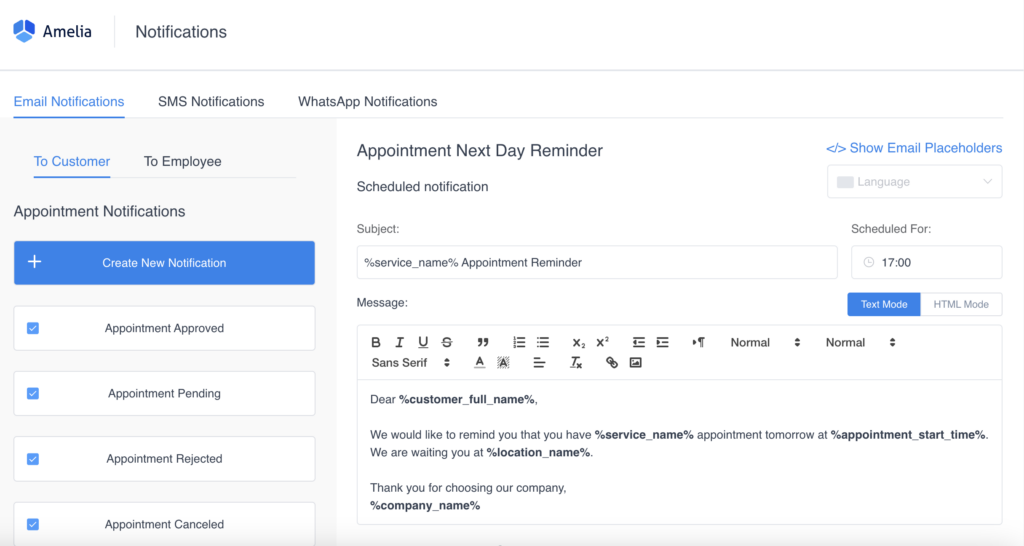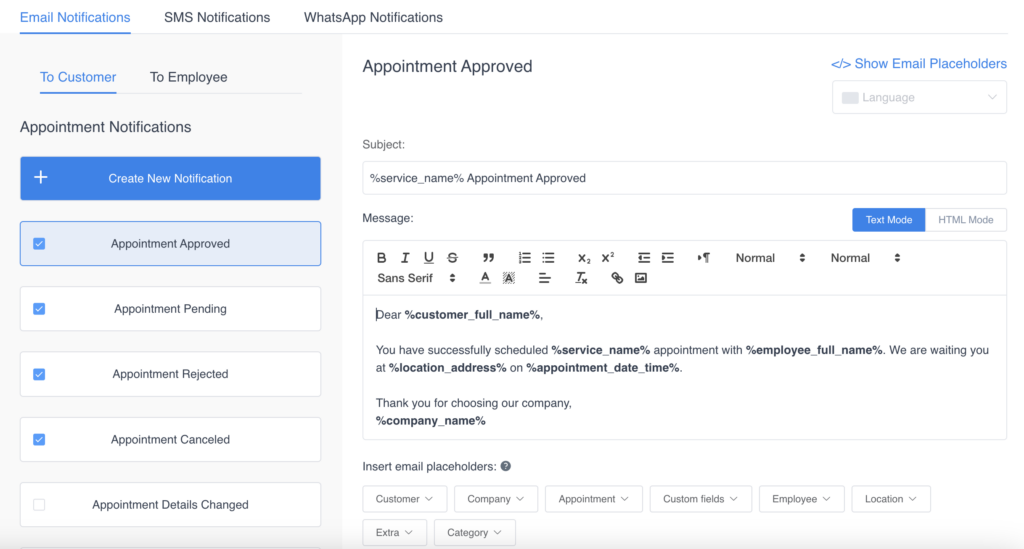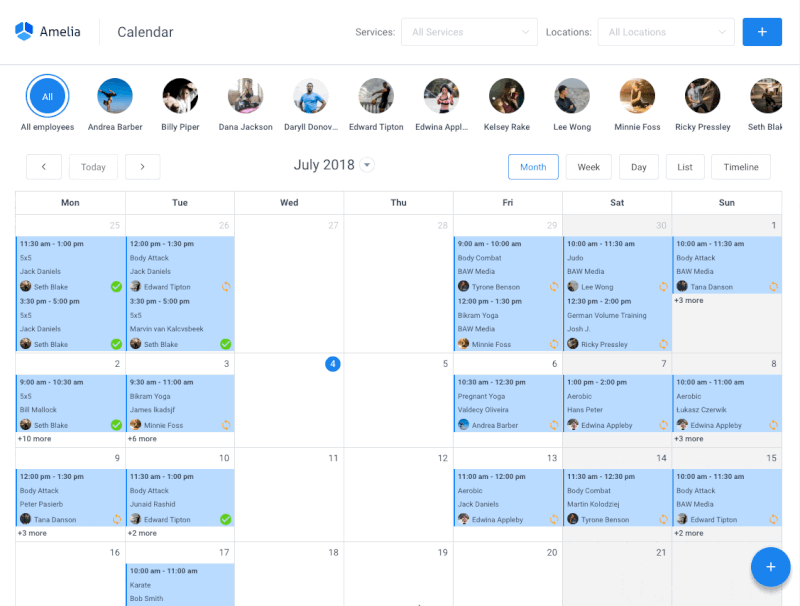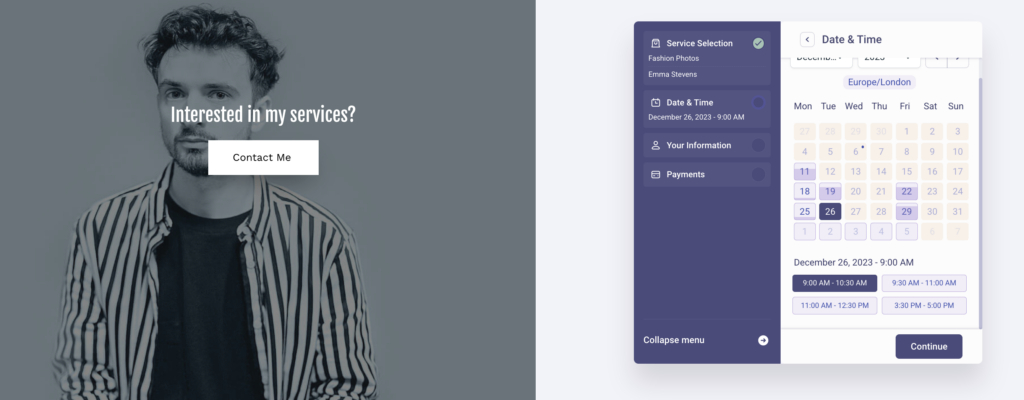Are you tired of the constant juggling act that canceled appointments bring to your service business? Perhaps you’ve found yourself scrambling to readjust, feeling the frustration of disrupted schedules and missed opportunities. Well, picture this: a world where your calendar flows seamlessly, clients are delighted, and disruptions are a thing of the past. Curious to know how to make this a reality?
This guide is your tailored solution, filled with expert strategies and innovative tips & tricks you can use to minimize appointment cancellations. Get ready to transform your approach to appointments and reclaim control of your schedule!
1. Use Reminder Systems to Minimize Last-Minute Cancellations
Reminder systems are the secret weapon in the battle against forgotten appointments. They’re the friendly nudge that keeps your clients on track and your schedule running smoothly. These systems use automated messages – whether through appointment emails or reminder texts – to jog your clients’ memories and ensure they remember their upcoming appointments. They’re a game-changer for service business owners seeking to minimize no-shows and last-minute cancellations.
Identify clients who regularly miss appointments
There are some clients that, despite regular appointment reminders, fail to show up. This can be very frustrating since business owners are losing money with these appointment cancellations.
What can they do to solve this problem?
The first thing is to track appointments. Identify which clients consistently do not show or cancel appointments. Then, direct specific efforts towards these clients to prevent further loss of income. Experiment a bit and try to determine a winning reminder tactic for each case.
Send them additional appointment reminders
To make sure such a client shows up, business owners can send them additional reminders. You can send two reminders before the appointment – an email reminder and a text reminder (cover all the bases). Notify them the day before and the day of the appointment.
Apart from this, call them on the phone on the same day as the scheduled appointment. Ask them if they are going to make it, and if not, you can schedule someone from the waitlist for that time slot.
Pro tip: Amelia is a WordPress booking plugin whose automated reminder feature can become your trusty sidekick in reducing canceled appointments. With customizable and automated reminders sent via email or SMS, Amelia ensures that your clients stay informed and remember their scheduled appointments. This not only reduces the likelihood of missed appointments due to forgetfulness but also maintains a level of engagement that encourages clients to commit to their bookings.

2. Craft Crystal-Clear Appointment Cancellation Policies
Crafting a clear cancellation policy isn’t just about rules; it’s the backbone of a smooth-running appointment system. It’s like a guideline that ensures both you and your clients are on the same page when it comes to cancellations, rescheduling, and commitment. This policy isn’t about locking anyone in; it’s about ensuring everyone’s on board with the appointment game plan.
By laying down these policies, service business owners create a supportive framework that builds trust, fosters reliability, and sidesteps misunderstandings.
3. Provide Flexible Scheduling Options to Prevent Canceled Appointments
Flexible scheduling options are the golden ticket in today’s busy world. They’re the key to accommodating diverse schedules and preferences, empowering your clients to manage their appointments with ease. For service business owners, offering flexible scheduling options translates to increased customer satisfaction and reduced appointment cancellations due to appointment scheduling mistakes.
Pro tip: Amelia’s user-centric interface puts the power of scheduling in the hands of your clients. With a range of options for rescheduling or modifying appointments, clients can effortlessly find alternative slots that suit their needs. This streamlined process not only caters to their convenience but also significantly reduces the chances of cancellations arising from conflicting schedules and double bookings.
4. Prevent Last-Minute Cancellations with Appointment Confirmations
Appointment confirmations are the secret sauce in ensuring clients are fully committed to their appointments. They’re the final handshake that seals the deal, ensuring that both parties are on board and ready to honor the scheduled time. Both email and text appointment confirmations have the role of a safety net that minimizes uncertainties, making last-minute cancellations as rare as possible.
Pro tip: Amelia’s appointment confirmation feature works its magic by gently nudging your clients to high-five their appointments. How? By asking for that “Yes, I’m ready!” click or tap. This action is not just about ticking boxes; it’s like a handshake between your clients and their commitments. Think of it as Amelia’s secret weapon against canceled appointments.

5. Discourage Last-Minute Appointment Cancellations with Deposits
Prebooking payments or deposits are the cornerstone of commitment in the world of appointments. They’re the financial pledges that clients make, indicating their serious intent to show up for their scheduled appointments. For service business owners, prepaid systems significantly reduce the occurrences of no-shows and canceled appointments.
Pro tip: Amelia’s integrated payment system facilitates the collection of deposits or prepayments during the booking process. This financial commitment makes the dreaded canceled appointments a thing of the past, as clients are more inclined to show up for appointments when they’ve paid for them (fully or partially). Amelia’s seamless payment setup ensures a hassle-free process for both clients and businesses, reinforcing commitment and reducing cancellations.
6. Master Waitlist Juggling
A waitlist isn’t just about jotting down names; it’s your proactive strategy for seamless operations. When appointment cancellations strike (as they inevitably do), an efficiently managed waitlist steps up to swiftly fill those vacant slots. It’s your tool to ensure that your schedule stays optimized, gaps are instantly filled, and your business doesn’t miss a beat.
For service business owners, especially those aiming to maximize their booking capacity, mastering the art of waitlist management is crucial. It’s like having a backup plan that keeps your operations at full throttle, ensuring that no potential appointment goes to waste.
How to manage your waitlist effectively?
Effective waitlist management involves a few key steps to ensure it serves as a valuable asset for your business:
1. Seamless Integration with Booking System: Ensure your waitlist seamlessly integrates with your booking system. This integration allows for automatic updates, ensuring that as cancellations occur, the waitlisted clients are promptly notified about available slots.
2. Clear Communication with Waitlisted Clients: Transparently communicate with clients on the waitlist. Notify them about their status, informing them that they’re next in line. Clear communication sets expectations and fosters trust.
3. Timely Notifications and Alerts: Implement a system that sends out real-time notifications or alerts to clients on the waitlist when an appointment becomes available due to a cancellation. This promptness ensures quick responses and efficient scheduling.
4. Priority and Fairness: Establish a fair and structured system for prioritizing clients on the waitlist. It could be based on the order of sign-up or any specific criteria you deem suitable for your business.
5. Optimize Waitlist Capacity: Regularly assess and optimize your waitlist capacity. If it’s consistently long, consider adjusting your scheduling practices or finding ways to accommodate more clients without overburdening your resources.
6. Regular Follow-ups and Updates: Maintain regular communication with clients on the waitlist even if they haven’t secured an appointment yet. Update them on their status, express gratitude for their patience, and assure them that you’re working diligently to accommodate them.
7. Data and Analytics Utilization: Leverage data and analytics from your waitlist. Analyze patterns to understand popular time slots, and the most common reasons for cancellations, and optimize your scheduling strategy accordingly.
8. Flexibility and Adaptability: Stay flexible and adaptable. Sometimes, clients might be unavailable when an appointment opens up. Having a system that allows for quick adjustments and rescheduling ensures maximum utilization of waitlist opportunities.
7. Double Down on Communication
Ever heard of the power of communication? It’s not just about words; it’s your service business’s secret weapon! It’s the art of conveying why appointments are more than mere time slots – they’re the backbone of your business’s success. Picture this: painting a vivid picture for your clients, showcasing how a last-minute cancellation affects not just your schedule but the entire experience for everyone involved.
Pro tip: Consider leveraging booking plugins like Amelia – its automated notifications aren’t just a luxury; they’re your service business’s way to connect with clients. Craft messages that resonate, illustrating why their appointments matter while gently nudging about the ripple effect of cancellations. These aren’t just reminders; they’re your business’s friendly nudge, expressing, “Your time’s precious, just like ours“. It’s about fostering a relationship of trust and reliability.
8. Combat Canceled Appointments with Incentives
Incentives are like magnets that pull clients toward honoring their commitments. They’re not just rewards; they’re your ace in keeping the appointment calendar full and vibrant. Here’s a closer look at why and how they work:
1. Motivating Commitment: Incentives serve as enticing rewards for clients who stick to their appointments. They act as motivators, making clients more inclined to keep their scheduled bookings. It’s the promise of a bonus or a reward that encourages clients to prioritize and honor their appointments.
2. Strengthening Client Loyalty: Offering incentives isn’t just about securing one appointment; it’s about fostering a long-term relationship. When clients receive benefits or rewards for their commitment, they feel valued and appreciated. This builds loyalty, making them more likely to return for future appointments.
3. Reducing Cancellations: By providing incentives, you create a tangible value for keeping appointments. Clients are less inclined to cancel when they know they’ll miss out on a beneficial reward or perk associated with their visit. It acts as a deterrent against last-minute cancellations.
4. Types of Incentives: Incentives can take various forms—discounts on future services, complimentary add-ons, loyalty points, exclusive offers, or even small gifts. Tailoring incentives to match your clients’ preferences and your business model maximizes their effectiveness.
5. Creating a Win-Win Situation: Incentives aren’t just about benefiting clients; they also benefit your business. They encourage repeat business, help in filling appointment slots consistently, and contribute to a positive client experience.
6. Promoting Positive Word-of-Mouth: Satisfied clients who receive incentives are more likely to share their positive experiences with others. This word-of-mouth marketing can attract new clients, further amplifying the benefits of your incentive program.
9. Optimize the Booking Experience
An optimized booking system is the heart of a seamless appointment experience. It’s a user-friendly interface that simplifies scheduling, reduces friction, and ensures a hassle-free process for both clients and service providers. For service business owners, an optimized booking system translates to improved client satisfaction and reduced chances of canceled appointments.
Pro tip: Amelia’s intuitive and customizable booking interface ensures a smooth and stress-free experience for clients. By optimizing the booking process, Amelia minimizes the likelihood of last-minute cancellations stemming from scheduling issues or difficulties navigating the system. This user-centric approach enhances client satisfaction and significantly reduces appointment disruptions.
10. Follow Up Like a Pro
Regular follow-ups are the key to maintaining a lasting connection with your clients beyond their appointments. They’re the thoughtful gestures that show appreciation, gather feedback, and nurture relationships, fostering a sense of loyalty and commitment to future bookings.
Pro tip: Amelia’s post-appointment follow-up feature facilitates automated communication to sustain engagement with clients. By sending personalized follow-up messages, Amelia allows service business owners to express gratitude, gather feedback, and address any concerns clients may have had during their appointments. This continual engagement not only builds rapport but also encourages clients to remain committed to future appointments.
No-Shows vs. Last-Minute Cancellations
Both no-shows and last-minute cancellations are challenges service businesses face, but they differ in their timing and impact:
No-shows
- Timing: No-shows occur when clients fail to appear for their scheduled appointments without prior notice.
- Impact: No-shows disrupt schedules significantly, leaving service providers with empty slots that could have been filled by other clients.
How do you handle a no-show?
- Send appointment reminders.
- Implement pre-paid appointments.
- Identify clients who regularly miss appointments and send them additional reminders.
Last-minute cancellations:
- Timing: Last-minute cancellations happen when clients cancel their appointments close to the scheduled time, often leaving little opportunity for the service provider to fill the slot.
- Impact: While last-minute cancellations allow some time for rescheduling or attempting to fill the slot, they can still disrupt the schedule and may result in lost revenue if the slot remains unfilled.
How do you deal with last-minute cancellations?
- Create a cancellation policy and inform your clients about it.
- Collect a deposit on confirmed bookings.
- Try to reschedule immediately.
How to Reduce Last-Minute Cancellations with Amelia?
Canceled appointments can disrupt schedules, impact revenue, and challenge client relationships. However, armed with a robust set of strategies and the innovative features of Amelia, service business owners can navigate these challenges with confidence.
From implementing reminder systems that keep appointments top of mind to establishing clear policies that foster commitment, each strategy plays a vital role in reducing cancellations and no-shows.
Amelia, with its suite of features and functionalities, acts as a trusted ally, enhancing and complementing these strategies. Through automated reminders, streamlined booking processes, and proactive waitlist management, Amelia empowers service business owners to maintain a reliable and efficient appointment system. The ability to secure commitments through prepayments, reinforce value communication, and sustain engagement via regular follow-ups elevates the client-business relationship and encourages a culture of commitment.
Amelia isn’t just an appointment booking solution – it’s a game-changer for service business owners seeking to minimize cancellations, maximize efficiency, and foster stronger client relationships. By leveraging the power of Amelia alongside these strategic approaches, service-based businesses can create a seamless, reliable, and client-centric appointment management system that propels their success in a competitive landscape.
Canceled Appointments FAQ
How do you handle a last-minute cancellation?
When handling a canceled appointment, promptly acknowledge the cancellation, express understanding, and offer to reschedule the appointment at a convenient time.
What is an appointment cancellation?
Appointment cancellation refers to the act of informing a service provider about the decision not to attend a scheduled appointment or event.
Can you charge for a canceled appointment?
Some businesses have cancellation policies that may include charging a fee for canceled appointments. However, these policies should be communicated clearly and fairly to clients beforehand.
What is the best way to handle a cancellation?
The best approach to handling a cancellation is to respond promptly, express understanding, offer flexibility for rescheduling, and maintain professionalism in communication.
What is a polite business response to clients who cancel appointments?
A polite business response to clients who cancel appointments acknowledges the cancellation, expresses understanding, offers assistance in rescheduling, and maintains a professional and courteous tone.
How do I stop people from canceling my appointments?
While it’s impossible to prevent all appointment cancellations, setting clear and fair appointment policies, sending reminders, offering incentives for commitment, and maintaining open communication can help minimize cancellations.



